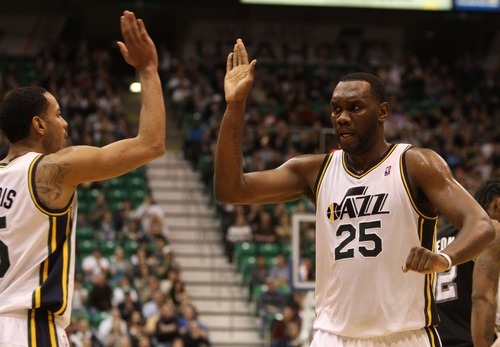This is an archived article that was published on sltrib.com in 2012, and information in the article may be outdated. It is provided only for personal research purposes and may not be reprinted.
For the Jazz, a midseason conclusion that's as plain as the broken nose on Kobe's face is an unhappy one. They lack — and desperately need — a star, and probably two.
Until they get that, they're just kind of running up and down the floor every night, attempting to ball, winning maybe a little more than they lose or a little less, trying to make the playoffs. They are putting in the effort as a group of players, but from a top-to-bottom philosophical standpoint they ultimately are posing and pretending. They can compete in their current state, but they can't be serious about winning.
To be a true contender, they have to have two bona fide stars, and then a nice complementary crew as re-enforcement. Any club that's really serious about doing what every team should attempt to do — win a championship — has to follow some version of this formula. Look back at the title teams through the years, or even those contenders that pushed them, and the evidence is there. If a team's present roster, like the Jazz's, can't provide it, then every move made, including coaching and personnel decisions, should be building toward it.
That's one of the reasons there is no shame in playing the Jazz's younger players, the lottery picks, at the expense of the less-talented-but-more-experienced veterans. They have to get time in order to move along the established route to authentic contention.
Over the All-Star weekend, looking at that collection of the best players on the planet, considering the way they play, the way they lead and compete, it's obvious that the Jazz have no veterans who can swim in that pool.
Some around here wanted Al Jefferson or Paul Millsap to be included in that group, but, even if they had made the West squad, they wouldn't have had much of a presence on it.
The Jazz don't have a team captain, which is symbolic of their biggest shortcoming. They don't have a leader. They don't have anyone to step up in those crucial situations when the all-for-one-and-one-for-all strategy isn't working. They need a go-to guy to grab games by the throat and bring them home.
Jefferson is a nice player, but even in the prime of his career he's not an authentic star. Same with Millsap — tough man, great attitude, occasional deliverer, but not the answer.
And so the Jazz go about their business, trying to buck the aforementioned trend and replicate what the Detroit Pistons did in 2004, namely, win by committee. Perhaps they believe they have no other choice.
But they do. Every move they make, coaching and personnel-wise, should edge them toward developing or acquiring or drafting the requisite stars, and progressing from there. Even the Pistons made a bold move the season they won that unusual title, trading for Rasheed Wallace and Mike James.
If the Jazz have no veterans who can be the kind of leaders they need, what's the problem with allowing Derrick Favors, Enes Kanter, Alec Burks and Gordon Hayward that opportunity? Build on the formula to win, don't waste time. There's no dishonor in giving increased minutes to the youngsters, or at least mixing their minutes in more generously, as a means of expediting their growth. It's visionary, possibly losing a few more games now and winning more than a few more next season. And who knows … those youngsters might be a revelation, sooner rather than later. If they stumble a bit, one more high draft pick is sweet compensation.
Two things are certain at this point: 1) The Jazz don't have the polished, finished stars they need to become a genuine threat, and 2) it's time for them to start polishing and finishing out the potential of the promising youngsters they do have. If the Jazz don't believe the youngsters will become the leaders, both in production and emotion, they need, which would be a disheartening deal considering two of them were No. 3 overall picks in the draft, then they should trade them.
The whole goal isn't allegiance to this particular group of young players, it's somehow getting the stars on the roster who are necessary for the Jazz to become legitimate contenders again.
Standing pat and doing what they've been doing thus far this season in an attempt to land as the seventh or eighth seed in the West may be honorable in the eyes of some, but it is shortsighted in attaining the ultimate competitive goal: becoming a serious threat, a serious winner. It's the only thing that matters in the NBA, other than turning a safe profit.



